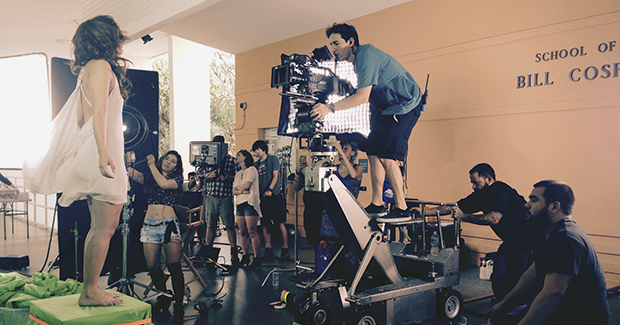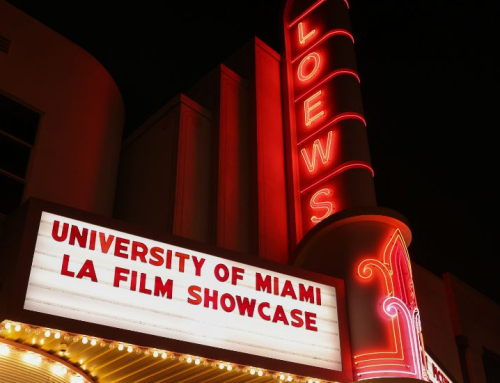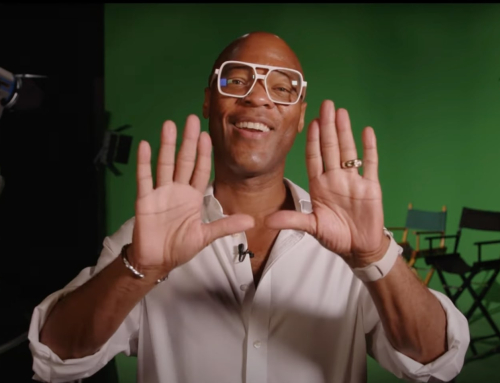Facing certain death after the planes hit the World Trade Center, Sonja D’Amico jumps from a window. Yet as she plummets 110 stories, she is enveloped not by raging flames but by soothing thoughts of her beloved.
Last week, School of Communication students and graduates filmed that scene, adapted from a 9/11 story by Stephen King, in the unlikeliest of places—the patio outside the Bill Cosford Cinema. Of course, when the 30-minute nonprofit, noncommercial film premieres at film festivals, no one will know that. No one will see that actress Juliana Harkavy, who portrayed Alisha in The Walking Dead, was actually standing on an improvised stool, her wind-swept mane blown by a hand-held fan, as UM alumnus Jonathan Franklin rolled back and forth on a loaned camera dolly to capture her beatific expression.
But that’s the magic of movies, and of turning a compelling story into an even more compelling screenplay. Which is what Barbara Leibell, a lecturer in the School of Communication, hoped to share with students in her scriptwriting class when, in January 2014, she asked King’s permission to adapt The Things They Left Behind—his story about a man haunted by the appearance of objects that belonged to colleagues who perished in the twin towers—into a screenplay.
It wasn’t an unusual request. Through what King calls his Dollar Babies program, the best-selling author has probably launched a number of careers, including celebrated director Frank Darabont’s, by granting aspiring filmmakers the right, for the price of a $1, to adapt his stories for film. A week later, King gave his consent, and Leibell and about 20 of her students, both former and current, got busy.
Sara Werner, a graduate of the School of Communication’s Master of Fine Arts motion pictures program whose short on human trafficking, Aurora, won best film at the 2012 Canes Film Fest, is the director. She and Franklin, a fellow M.F.A. grad and the film’s director of photography, are shooting the script, written and adapted by Jake Gillman, who graduated May 7 from the School of Communication with a major in scriptwriting. He called the exhausting year-long process of getting the script “to the point we were satisfied” an “amazing opportunity” and the day last week when the crew recreated the collapse of the towers in the Miami office set of the TV show Graceland an “emotional, thrilling, humbling and really nerve-racking” experience.
“The office was a mess. There was soot everywhere. It was so real I had to step outside,” Gillman said. “Being from New York, 9/11 hits close to home. It’s a sensitive subject, so you want to do it and Stephen King’s story justice.”
Under Leibell’s guidance, Gillman and his team expanded King’s narrative. They turned their version of The Things They Left Behind into a dreamy love story, with actor Tom Frank, who appeared on Dexter, playing the bereaved boyfriend of the woman whose red sunglasses turn up in his New York apartment—donated by The Filling Station Lofts, a firm dedicated to fostering film and arts in Miami—a year after she jumped.
After reading the script, Mike Gabriel, the former CIO of HBO, and Missy Jenkins, former aide to Newt Gingrich, donated funds. Respected industry professionals, including David Frankel, director of The Devil Wears Prada and Marley and Me, and Howard McCain, director of Outlander, agreed to serve as mentors. And Maria Elizabeth, a hair stylist and make-up artist from Virginia, offered her services and time for free.
“When I read the script I cried. It spoke to me,” Elizabeth said outside the Cosford last week, in between freshening Harkavy’s lipstick and tousling her hair. “I think it will speak to a lot of people, so I wanted to be part of it.’’
Still, the students, who include costume designers from the Department of Theatre Arts and script supervisors from the College of Arts and Sciences, face the same daunting challenges many filmmakers face: long hours, no pay, and a limited budget. The producer, Xinyue Chen, an M.F.A. film student who already has spent countless hours securing permits and low-cost or donated locations and equipment, and negotiating salaries for the cast, (all Screen Actors Guild professionals who have agreed to work for $100 a day) says she’s running on adrenaline. But, she too, is thrilled with the opportunity.
“Every morning, I wake up stressed because I know there will be new troubles coming,” Chen said.”This film is a big challenge for student filmmakers. But when I see the footage we made together, I know it is worthy. I’m so proud of it.”
She and the rest of the students also know that adapting a King story could be a steppingstone, if not a career-maker. After all, Darabont, who adapted and directed two multiple Academy Award-nominated films, The Green Mile and The Shawshank Redemption, from two Stephen King stories, was one of the first Dollar Babies. He asked King’s permission to write and direct his first film, the author’s The Woman in the Room, when he was 24.
“King liked Frank’s work so much he continued working with him on major projects,” Leibell said. “So this is a great honor and opportunity for our students. No matter what happens, they’re all learning valuable filmmaking skills, getting material for their reels and resumes, and making a beautiful, meaningful film.’’
To support post-production costs of the film, email Leibell at DLeibell@miami.edu or call her at 305-582-6571.
This story was originally published in e-Veritas.







